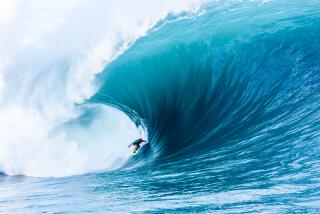U.S. Tour Checks Out Local Motion
- Share via
This weekend’s U.S. Bud Tour pro contest in Santa Cruz launches another year of grueling competitive surfing. According to Rockin’ Fig, the recession has kept 1993’s events at 10, down from a dozen or so in healthier years. All events are scheduled for California.
For the international set, the ASP (Assn. of Surfing Professionals) tour picks up in April with the Rip Curl Classic at Bells Beach, in Victoria, Australia.
Figgy, what’s the dif between U.S. Bud Tour and the ASP-World Championship Tour?
Well, money. You wanna buy a world championship event, it’ll cost you, but you get the world’s best surfers in the water. The U.S. Bud Tour is part of the ASP and is considered a starting block to help qualify surfers for the ASP Tour. The purse for Bud Tour contests is $20,000.
In the ASP-World Championship Tour, most of the contests are $100,000. These are big companies that sponsor ASP events. Rip Curl is a big wet-suit company in Australia. The biggest events, worth $150,000, are sponsored by Coca-Cola and Marui, a big Japanese department store that is sponsoring a contest in Japan, where the sport is taking off.
This year only one ASP-World Championship Tour event is scheduled for the continental United States, and luckily it’s in Southern California in June. But for those wishing to see some good surf action, the best bet is to see a U.S. Bud Tour event. Local events include Huntington Beach on June 2-6 and Lower Trestles, Sept. 14-19. Further, but within traveling distance are several events in Los Angeles, San Diego and Ventura counties.
Figgy, shall we give the whole Bud Tour schedule?
Yeah, give it to them; there are lots of people who might wanna watch one.
After this weekend’s contest in Santa Cruz, next up is Pismo Beach, Feb. 10-15, then Seaside Reef (northern San Diego County), March 3-7, Imperial Beach, May 26-31, and Huntington Beach, June 2-6. Then the tour continues at Oceanside, June 16-20, Malibu Beach, July 21-25, Lower Trestles, Sept. 14-19, Ocean Beach (San Francisco), Oct. 13-17, and finishes with the championships in Ventura, Nov. 3-7.
Fig, can you earn a living being a pro surfer?
Tell you what, a lot of these guys are just making it every year--in contrast to the handful of top stars who command million-dollar salaries. The lesser stars might get some money, but the travel costs really eat you up eventually. They have sponsors to help bail them out.
But really, they’re having the time of their life, surfing where you want at some of the best beaches. And getting paid to do it. Isn’t it what you want?
Is there a down side?
What happens after five years is the new kid on the block starts to knock on the door. The veteran may not be making the big contest money when he should, and reality comes into play. It’s time to get a real job, because you have nothing but a bunch of good memories. Lots of these guys come back into the industry as sales reps, because companies like a semi-hardcore guy up there selling their product.
If you make it to stardom like Kelly Slater (1992 ASP world champion), well, it’s big sponsor money and a starring role in “Baywatch.” But there are zillions out there, and only a handful can climb to the top.
PASSAGES: Surfers mourned the death of Dewey Weber, a South Bay pioneer who died Jan. 7 of cardiac arrest. Weber, 54, was known as “the Little Man on Wheels” and the producer of the Weber Performer, one of the best-known long boards in Southern California history.
Allan Seymour, surfing’s ex-officio curator, once included Dewey among surfing’s living legends. According to Seymour, of San Juan Capistrano, Dewey “was credited as being the first of the contemporary hotdoggers on a surfboard.”
Lorrin Harrison, who at 79 is one of Orange County’s surfing pioneers, recalled that Dewey was big in the ‘60s among surfboard manufacturers. In the ‘80s, Dewey began holding informal long-board contests in the South Bay.
“I went up and surfed in one contest a few years ago. He invited a bunch of us, and I went up with one of the Paskowitz boys.” Harrison said he heard about Dewey’s death from a fellow surfer. “I surfed with a lot of people in my life; many of them knew Dewey.”
More to Read
Sign up for The Wild
We’ll help you find the best places to hike, bike and run, as well as the perfect silent spots for meditation and yoga.
You may occasionally receive promotional content from the Los Angeles Times.






